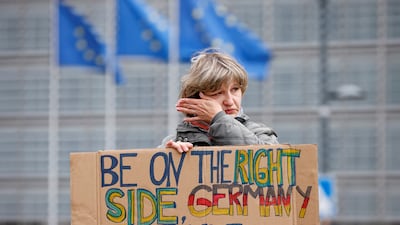Live updates: follow the latest news on Russia-Ukraine
Embargo support: Austria on Monday joined Germany in saying it could live with an embargo on Russian oil which it had previously opposed, moving the European Union a step closer to such a move.
The Alpine country's Climate Minister Leonore Gewessler said Austria was "ready to pull its weight" if the European Commission proposes a Russian oil ban and it is approved by the EU's 27 members.
Like Germany, Austria has reduced its reliance on Russian oil and went through March without processing any of it at all, Ms Gewessler said before a meeting of the bloc's energy ministers.
It came as the EU stepped up preparations for potential fuel shortages as the ministers met in Brussels in the shadow of Russia’s threats to cut off supplies.
The emergency summit was called after Poland and Bulgaria had their Russian gas imports stopped for refusing to pay in roubles, a demand made by the Kremlin after sanctions linked to the invasion of Ukraine were imposed.
Modi comments. Indian Prime Minister Narendra Modi called for dialogue to end the war in Ukraine at the start of a European tour on Monday but steered clear of condemning Russia over the invasion.
India, which imports much of its military hardware from Russia, has long walked a diplomatic tightrope between the West and Moscow, and has called only for an immediate end to hostilities.
"We have insisted on a ceasefire and called for talks as the only way to resolve dispute since the start of the Ukraine crisis," Modi told reporters after talks with German Chancellor Olaf Scholz in Berlin.
"We believe that there won't be any winners in this war and everyone will lose, which is why we are in favour of peace," he said.
Besides the humanitarian impact on Ukrainians, pressure on oil prices and global food supplies is also "putting a burden on every family in the world," he said.
Israel anger: Israel on Monday summoned the Russian ambassador in Tel Aviv over “outrageous” remarks by Moscow about Jews.
Russian Foreign Minister Sergey Lavrov claimed on Sunday that Nazi leader Adolf Hitler, who oversaw the killing of six million Jews, had “Jewish blood”.
The comments were dismissed as “unforgivable and outrageous” by his Israeli counterpart Yair Lapid.
Mr Lavrov’s remarks were “a terrible historical error,” Mr Lapid said in a statement. “Jews did not murder themselves in the Holocaust.”
The Israeli foreign ministry said it had summoned the Russian ambassador for a "clarification meeting" over the comments, made in an interview on Italian TV programme Zona Bianca on Sunday.
Israel marked Holocaust Remembrance Day last week, with sirens blaring out across the country to commemorate the millions of Jews killed by the Nazis during the Second World War.
Scholz defence. German Chancellor Olaf Scholz offered an unusually animated defence of his policy towards Ukraine, rebuffing critics who say his military support has been too slow as well as pacifist dissenters who say no arms should be sent at all.
Mr Scholz won plaudits for facing down a crowd of hecklers who whistled and shouted anti-weapons slogans at an International Workers' Day rally on Sunday, telling them their views were outdated.
“I respect any pacifism and any opinion. But it must seem cynical to citizens of Ukraine if they are told they should defend themselves against Putin's aggression without weapons,” he shouted over the protesters.
“We will not allow borders to be pushed aside or territory to be conquered with violence,” he said at the event in Duesseldorf.
Russia losses. Russia has lost a quarter of the combat power it sent to Ukraine at the beginning of the invasion, British intelligence has found.
The UK’s Ministry of Defence said it could take years before many of the groups were fit for action again.
Tens of thousands of Russian troops are estimated to have been killed during the first nine weeks of war but Moscow has not given a figure. The Ukrainian military has also kept its death toll secret.
“At the start of the conflict, Russia committed over 120 battalion tactical groups, approximately 65 per cent of its entire ground combat strength,” the MoD said.



























































































